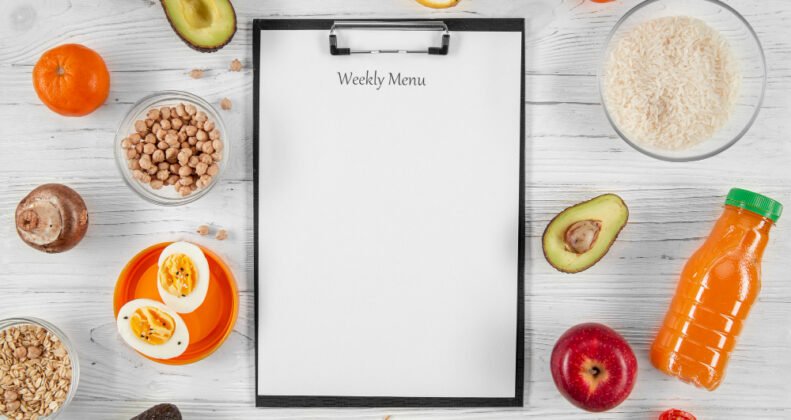It’s simple to become lost in a sea of contradicting dietary recommendations in the information age when everyone has access to a never-ending supply of health advice. What are you supposed to believe? What needs to be disregarded? We’ve gathered information from BS Budwal the best nutritionist in Mohali to dispel some of the most widespread dietary myths and clear up any confusion. Myth 1: Carbs Are the Enemy The idea that carbs are unhealthy by nature is one of the most pervasive fallacies in nutrition. Many people think they must give up carbohydrates to lose weight completely. The top nutritionist in Mohali does stress that not all carbohydrates are made equal. When ingested in excess, refined carbohydrates like white bread and sugary snacks can cause weight gain as well as other health problems. On the other hand, energy production, cognitive function, and general health depend on complex carbs, which are found in whole grains, fruits, and vegetables. Rather than completely cutting out carbohydrates, the idea is to concentrate on quality and quantity control. Myth 2: Eating Fat Causes Fat Due to the unfair demonization of fat for many years, many people have turned to low-fat diets in the hopes of becoming lighter. However according to the best nutritionist in Mohali, fat is a necessary nutrient that your body needs for the absorption of fat-soluble vitamins, the creation of hormones, and the health of your brain. Not all fats are bad for you. Good fats, including those in nuts, seeds, avocados, and olive oil, can make you feel satiated for longer periods, which can help you avoid overindulging. Rather than the beneficial fats included in whole foods, processed diets heavy in added sugars and trans fats are frequently the true causes of weight gain. Myth 3: You Can Lose Weight by Skipping Meals It’s a popular misperception that losing weight might result from missing meals. The theory is that you will eat fewer calories if you eat fewer times a day. The best nutritionist in Mohali warns that this strategy can backfire. Missing meals can lower blood sugar, slow down metabolism, and increase the likelihood of overeating later in the day. Focus on eating well-balanced, nutrient-dense meals to maintain a consistent energy level and an active metabolism rather than missing meals. Myth 4: Detox Diets Cleanse Your Body Detox diets and cleanses have become popular as an easy way to help people lose weight by getting rid of impurities from their bodies. The best nutritionist in Mohali, though, advises against following these diets as they are frequently hazardous and useless. Your liver, kidneys, and digestive tract are your body’s inbuilt cleansing systems, and they are incredibly powerful. To assist your body’s natural detoxification processes, aim to maintain a balanced diet high in fiber, antioxidants, and water instead of depending on detox diets, which can be restrictive and deficient in nutrients. Myth 5: Eating Late at Night Causes Weight Gain A common misconception is that eating after midnight always results in weight gain. The greatest nutritionist in Mohali clarifies that what counts is the total amount and quality of food you eat, not when you eat it. The things that matter considerably more are what and how much you eat. Your late-night munchies may cause weight gain if they are heavy in calories, sugar, or bad fats. But eating a healthy, portion-controlled dinner or snack in the evening won’t make you gain weight. It all comes down to choosing healthfully and in balance. It can be difficult to navigate the world of nutrition, especially in light of the abundance of false information available. The goal of the best nutritionist in Mohali is to dispel these widespread misconceptions so that you may make healthier, more informed decisions. Recall that maintaining long-term health and fitness requires an eating strategy that is sustainable and balanced. If you’re ever unsure, speaking with a licensed nutritionist can help you receive individualized guidance based on your requirements and objectives.
It’s not always expensive to eat healthily. You can keep up a healthy diet without going over budget if you know what to do and invest in the correct techniques and preparation. BS Budwal, a famous dietician in Chandigarh, is here to offer budget-friendly advice on eating a nutritious diet. These useful tips will help you make the most of your food budget while staying healthy, whether you’re a busy professional, student, or family on a limited budget. Tips to Maximize Food Budget & Stay Healthy from famous Dietician in Chandigarh 1. Plan Your Meals Making your meal plans in advance is one of the best strategies to eat healthy and save money. Make a weekly meal plan that consists of all the meals and snacks you consume. This guarantees that you only buy what you need and helps you avoid making impulsive purchases. Taking advantage of promotions and discounts is another benefit of planning. 2. Make a Shopping List After you’ve decided on your menu, create a thorough shopping list. Follow the list to prevent purchasing extraneous things. Making a list before you shop helps you avoid buying convenience foods and costly, unhealthy snacks. It also helps you maintain focus on your dietary objectives and saves time. 3. Purchase in Large Quantities Purchasing in bulk can sometimes result in lower costs, particularly for basic goods like grains, beans, nuts, and seeds. These products are easily stored and have a long shelf life. To take advantage of bulk pricing, look for bulk bins at your neighborhood grocery shop or think about becoming a member of a wholesale club. 4. Select Local and Seasonal Produce In addition to being more reasonably priced, seasonal fruits and vegetables are also fresher. Because it needs less storage and transportation than imported food, local produce is frequently less expensive than imported types. To obtain the greatest prices on locally grown and seasonal produce, visit farmers’ markets or your neighborhood grocery shop. 5. Prepare Food at Home Getting takeaway or dining out may add up quickly. One affordable approach to make sure you’re eating balanced, healthful meals is to cook at home. You can better manage the contents and amount sizes when you prepare your food, which will help you maintain your dietary objectives. 6. Make Good Use of Leftovers Keep leftovers from going to waste. Utilize them to make new dishes or add them to your following day’s meal plan. Leftover roasted veggies, for instance, are great in omelets, salads, and sandwiches. Repurposing leftovers extends the life of your food budget and helps cut down on food waste. 7. Select Whole Foods. Compared to whole meals, processed and convenience foods are frequently more costly and less nutrient-dense. When purchasing groceries, try to stick to entire foods like dairy, fruits, vegetables, whole grains, and lean meats. These meals offer vital nutrients and are typically more economical in the long term. 8. Make Easy, Nutritious Dinners Eating healthily doesn’t have to be difficult. A few healthful components prepared into simple meals can provide nutrition and satisfaction. Seek dishes with few preparation steps and simple components. This method guarantees that you receive the nutrients you require while saving time and money. 9. Reduce Your Meat Consumption One of the priciest things in your supermarket cart may be meat. Consider increasing your intake of plant-based proteins such as those found in beans, lentils, tofu, and tempeh. These substitutes are usually less expensive and offer vital nutrients. Cutting back on meat intake can benefit the environment as well. 10. Grow Your Food If you have the room, you might want to plant a little garden. Enjoying fresh, organic produce may be enjoyable and affordable if you grow your fruits, veggies, and herbs. Herbs and small vegetables can be grown in a few pots on a ledge or balcony, which will cut down on your grocery expenses. Conclusion Budget-friendly healthy eating is completely achievable with a little preparation and astute buying. BS Budwal, a reputable dietician in Chandigarh, offers some advice that can help you enjoy healthful meals without going over budget. Always remember that making wise decisions and controlling your expenses are essential to eating a nutritious diet. These tips can help you stick to your budget while eating a balanced diet and supporting your general health. For individualized dietary guidance and help with meal planning, contact BS Budwal, your go-to dietician in Chandigarh. We can work together to develop a personalized plan that both fits your budget and achieves your health goals.
Addressing Food Allergies: Tips from the Best Dietician in Chandigarh Food allergies are becoming more prevalent and can have a serious negative effect on a person’s quality of life. It takes professional advice to navigate the complications of food allergies, which is why Chandigarh’s top dietician is so important. At BS Budwal, we provide complete nutritional solutions to manage and minimize allergic reactions since we recognize the difficulties that people with food allergies experience. Here, we offer insightful advice on how to successfully handle food allergies from the best dietician in Chandigarh. Understanding Food Allergies Food allergies arise from the immune system misinterpreting specific dietary proteins as toxic. A wide range of symptoms, from minor discomfort to severe responses, may be brought on by this. Nuts, dairy, eggs, wheat, soy, fish, and shellfish are among the common allergies. Maintaining health and well-being requires managing these allergies and knowing which ones to avoid. Tips from the Best Dietician in Chandigarh 1. Accurate diagnosis and testing Accurate diagnosis is the first step towards controlling food allergies. To identify particular allergies, the best dietician in Chandigarh suggests doing a thorough allergy test. This may entail blood testing, skin prick tests, or elimination diets. The cornerstone of a successful allergy management strategy is an accurate diagnosis. 2. Reading Food Labels Carefully It’s crucial to carefully read food labels after you know which items to stay away from. The top nutritionist in Chandigarh suggests checking packaged items for hidden allergies. Allergen alerts and ingredient listings can help you prevent unintentional exposure. Become familiar with other names for allergies, as they may have various labeling. 3. Cooking Food at Home You can maintain ingredient control and prevent cross-contamination when you cook at home. The best dietician in Chandigarh advises cooking whole, fresh ingredients in homemade meals. As a result, there is a lower chance of unintentional exposure to allergens included in prepared or restaurant items. Purchasing a few high-quality cookbooks or internet resources will help ease this shift. 4. Establishing a Safe Dining Space Keeping your home dining area safe is essential to controlling food allergies. The best dietician in Chandigarh suggests utilizing specialized equipment and utensils, keeping surfaces spotless to avoid cross-contamination, and segregating meals that cause allergies from those that don’t. Inform your friends and family about your allergies to create a welcoming environment. 5. Emergency Preparedness Allergen exposure can occur accidentally even with the best of intentions. Antihistamines and an EpiPen (epinephrine auto-injector) should always be carried, according to the best dietician in Chandigarh. Make sure you know how to use these medications in an emergency, as well as anyone nearby. Make an action plan that outlines what to do in the event of an allergic response. 6. Seeking Expert Advice Having expert advice is crucial when managing food allergies because it can be difficult. Customized diet programs made to meet each person’s demands are provided by the top dieticians in Chandigarh. Getting regular checkups guarantees that your dietary needs are satisfied without exposing you to allergies. Any nutritional inadequacies brought on by dietary restrictions can also be addressed with professional assistance. Why Choose BS Budwal? Being the best dietician in Chandigarh, we at BS Budwal take great satisfaction in providing individualized care and professional advice for managing dietary sensitivities. Our all-encompassing strategy consists of: Accurate Allergy Testing: We offer accurate diagnostic services to pinpoint certain food sensitivities. Personalized Dietary Plans: Our dieticians design meal plans that are specific to your requirements and tastes. Ongoing Support: To make sure your diet plan is flexible and successful, we provide ongoing support and oversight. Educational Resources: We offer information and materials to assist you and your loved ones in comprehending and successfully managing dietary allergies. Managing food allergies necessitates a combination of precise diagnosis, painstaking preparation, and expert advice. At BS Budwal, the best dietician in Chandigarh is dedicated to assisting people in managing their food allergies and leading happy, healthy lives. You can confidently and easily manage the complexity of food allergies by paying attention to this professional advice. To start your path to improved health and well-being, contact BS Budwal now.
Top 10 Dieticians in Chandigarh: Finding the Best Nutrition Guidance In today’s fast-paced world, maintaining a healthy lifestyle and balanced diet is essential, and having the appropriate counsel may make all the difference. You’ve come to the correct spot if you’re looking for the best dietician in Chandigarh. The top 10 dieticians in Chandigarh are listed below, and they can provide you with individualized nutrition plans and knowledgeable guidance to help you reach your fitness and health objectives. A healthy diet is important for nutrient supply, disease prevention and weight management. It helps to maintain a good energy level. Healthy eating supports brain function, which can improve mood, and cognitive function, and reduce the risk of mental health issues. 1.Dietician BS Budwal BS Budwal is the best dietician in Chandigarh who offers diet plans that are specifically designed and researched to cater to these diverse needs. He also offers one-to-one counselling sessions where he interacts and understands your body needs according to your body type, lifestyle and habits. 2.Dietician Shreya Katyal Dietitian Shreya Katyal is well-known in Chandigarh’s nutrition community for her all-encompassing approach to nutrition and wellness. She is a top pick for anyone looking for the best nutritionist in Chandigarh since she provides individualized diet programes that take into account each person’s unique health needs and lifestyle constraints. 3.Dietician Ritika Sodhi Dietitian Ritika Sodhi treats patients with compassion while combining her knowledge of clinical nutrition. She is skilled at creating customized nutrition regimens for a range of medical issues, ensuring her customers successfully meet their health objectives. 4.Dietician Ankita Gupta Dietitian Ankita Gupta is well-known for her creative approaches to nutrition and for concentrating on realistic and long-lasting diet programmes. She is one of the greatest dietitians in Chandigarh since her advice is very helpful for people with lifestyle-related health conditions. 5.Dietician Lavleen Kaur Renowned for her efficacious weight-loss initiatives, Dietitian Lavleen Kaur offers all-inclusive eating regimens that tackle an array of health issues. Diet Insight, her clinic, is highly respected for its supportive environment and evidence-based approach. 6.Dietician Pallavi Jassal Pallavi Jassal, a dietitian, is renowned for creating diet programmes that are easy to follow and fit into the busy schedules of her customers. Her practice, LiveLifeMore Diet & Wellness Clinic, provides thorough nutritional counselling for a range of medical conditions. 7.Dietician Shubhra Jain Dietitian Shubhra Jain is well-known for her knowledge of nutrition in children and adolescents. Several families in Chandigarh chose her as their nutritionist because of her skill in developing interesting and nourishing food programmes for kids and teenagers. 8.Dietician Deepti Gandhi Dietitian Deepti Gandhi provides individualized diet regimens that are simple to adhere to and effective, with an emphasis on lifestyle modifications and long-term health advantages. Her focus on the needs of the patient guarantees that every client gets the consideration and care they require. 9.Dietician Nupur Malhotra Dietitian Nupur Malhotra offers diet regimens that not only target weight loss but also enhance general health, with an emphasis on holistic well-being. Her dedication to her clients’ health and individualised consultations have made her one of Chandigarh’s best dietitians. 10.Dietician Kamal Yadav She is among the greatest dietitians in Chandigarh because of her extensive knowledge and attentive treatment. Specialised food regimens are offered by dietitian Kamal Yadav for long-term health issues like diabetes, hypertension, and cardiovascular disorders. Why choose BS Budwal as the best Dietician in Chandigarh? BS Budwal is considered the best dietician in Chandigarh for several reasons. We provide one-to-one counselling sessions where we understand what are the requirements of our client and then provide customized diet plans accordingly. Other than nutrition plans and diets we also offer therapy for mental illness, anger management, etc. Selecting the appropriate dietitian can have a big impact on your health path. Think about your wants and preferences when looking for the best dietician in Chandigarh. A qualified dietician will assist you in maintaining a balanced and healthful lifestyle in addition to assisting you in reaching your health objectives. You should consider BS Budwal as your first choice. For more details contact us.
How to Read Food Labels for Heart Health: A Guide by BS Budwal, Best Dietician in Chandigarh Maintaining a healthy heart is very essential in today’s stressful environment. As everybody is busy in chasing success wealth and fame, one organ which is severely affected is “heart” .Today heart problem which was earlier detected only in older people, are affecting young adults and teenagers also. Hence It is the perfect time to talk about heart-healthy solutions. BS Budwal, the best dietician in Chandigarh, is available to help you with this process and make decisions that will benefit your heart health. The Significance of Food Labelling for Heart Health Reading food labels is a healthy skill to have. Important details regarding the nutritional content of packaged foods are provided by food labels. It might be quite beneficial to pay attention to specific nutrients and ingredients when regulating heart health. Here’s how to check food labels effectively in diet: 1. Check the Serving Size A serving, also known as serving size, refers to the quantity of food indicated on a product’s Nutrition Facts label or food label. This indicates the portion size for which the nutritional information is provided. It’s essential to match this serving size with your actual portion to get accurate nutrient intake. 2. Identify Key Nutrients Focus on specific nutrients that impact heart health: 1. Sodium (Salt): High sodium intake is linked to high blood pressure. Always prefer foods labelled as “low-sodium” or “no added salt.” 2. Saturated Fat and Trans Fat: These fats can raise cholesterol levels. Opt for foods with lower saturated and trans fat content. 3. Total Fat: Choose foods with healthier fats like unsaturated fats (e.g., olive oil, nuts) over saturated fats (e.g., butter, palm oil). 4. Cholesterol: Limit foods high in cholesterol, as it can contribute to heart disease. 3. Look for Heart-Healthy Ingredients Seek out foods that contain heart-healthy ingredients: Whole Grains: Foods with whole grains are rich in fiber, which is beneficial for heart health. Fruits and Vegetables: Look for products that include fruits and vegetables, which are packed with essential vitamins, minerals, and antioxidants. 4. Avoid Hidden Sugars Watch out for hidden sugars, listed under various names like corn syrup, fructose, and sucrose. Excessive sugar intake can contribute to heart disease and weight gain. 5. Use % Daily Value The % Daily Value (%DV) helps you understand how much of a specific nutrient one serving provides based on a 2,000-calorie daily diet. Aim for foods with lower %DV of sodium, saturated fat, and cholesterol. 6. Limit Processed Foods Convenience foods frequently have elevated levels of sodium, unhealthy fats, and additional sugars. Try to eliminate these processed foods, and replace them with healthy alternatives. Conclusion Reading food labels for heart health is a skill that can empower you to make healthier choices. As the best dietician in Chandigarh, BS Budwal encourages you to prioritize whole, nutrient-dense foods and use food labels as a tool to support your heart health goals. For personalized guidance on crafting a heart-healthy diet plan, schedule a consultation with BS Budwal today. Together, we can take proactive steps towards improving your heart health through smart nutrition choices. Moreover BS Budwal always believe in homemade food, also he always prefer home based diet over other costly diets. Start your journey towards a healthier heart today!







